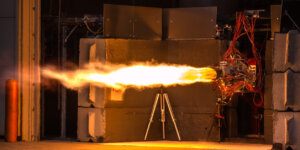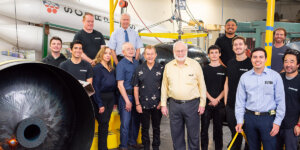
Roderic Vanderscoff poses in front of the Saturn 5 rocket at the NASA Johnson Space Center in 2017.
Eyes darting between 27 graphs that displayed live data and video feeds, Roderic Vanderscoff, M.S. AE ’16, waited inside the main control room to see if the Alpha rocket — a project he had poured his heart into for the past five years — would successfully launch and reach orbit.
If successful, Firefly Aerospace, a Texas-based private aerospace company developing commercial launches to make space exploration more affordable and accessible, would become the fifth U.S. rocket builder to reach orbit in the past 15 years.
As Vanderscoff, the lead propulsion engineer, waited, his mind flashed to a moment just one year earlier: an unsuccessful launch that ended in the detonation of the rocket mid-flight.
As he tried to calm his nerves, the countdown began.
3.2.1. Blast off!
“It’s at this moment my heart is beating the strongest,” Vanderscoff said. “I’m nervous but the adrenaline is beating, and I’m focused on taking in as much information as I can.”
The Stage 1 Reaver Engine propelled the rocket into space for just three minutes. For him, this short moment represented the culmination of years of work.
“Once we ignited that second stage,” Vanderscoff said, “there was like this release of emotion. I started crying just from happiness of seeing that the part of the system I’d been working on for years worked.”
Just seven years earlier, Vanderscoff had helped found the Liquid Propulsion Laboratory (LPL) as a graduate student at the USC Viterbi School of Engineering. The program gives students an opportunity to explore liquid propulsion technologies commonly used by companies like SpaceX and Virgin Galactic.
Now, on Saturday, October 1, 2022, Vanderscoff and Firefly Aerospace were joining the small but slowly growing club of private companies to conquer space.
A Lifelong Dream
Space exploration has always been Vanderscoff’s dream. He remembers a middle school class trip to the Chabot Space & Science Center where he first learned about Europa, Jupiter’s frozen moon with trapped liquid water.
Europa sparked a curiosity in him that made him ask: “What could be there?” And that question led him to pursue this passion in college, studying physics with an emphasis in astrophysics at UC Davis. Soon after graduating, Vanderscoff realized he wanted to learn how to apply his physics skills in the field of rocketry by pursuing his masters at USC.
“USC was the only school in the nation I knew of that had a Department of Astronautical Engineering,” Vanderscoff said. “USC having a whole department dedicated to this field of study told me they were focused on providing a detailed education on this topic and were dedicating a lot of resources to do so.”
At USC, he realized there were “lots of opportunities for betterment of Earth life through space—like with satellites, climate change and communication,” Vanderscoff said.
After completing his master’s degree in 2016, he immediately joined Firefly as an intern, making just $625 a week. He had no complaints as he packed his bags and made the big road trip to Austin, Texas.
“I was like, ‘You know what? Let’s see what happens.’ I’m gonna throw my eggs in this basket,” Vanderscoff said.
He recalls how his initial experience as an intern was full of excitement and passion. Because Firefly was a smaller company, he was exposed to an environment of passionate people where he could learn a lot.
However, things fell apart pretty quickly. Firefly lost funding, colleagues lost their jobs, wages were slashed.
In November 2016, Vanderscoff worked as an engineer during the weekdays and as a host at a local restaurant during the weekend: he made $12 an hour at Café Blue. Vanderscoff recalls how “some of us tried to keep working and to keep the dream alive. There was still a chance that things can go well.”
Just months later, Firefly went bankrupt and liquidated in March 2017. Vanderscoff had to move back to Los Angeles and worked for Aerojet Rocketdyne for the next six months. “It was sad,” he said. “I felt like I had put a lot of physical and emotional energy into trying to make it work.”
Firefly Reborn
In May 2017, Noosphere Ventures bought out the assets of former Firefly Space Systems. The company, reborn as Firefly Aerospace, attracted enough funding for at least two launches.
When Firefly called Vanderscoff and asked him to come back, he decided to give it another go. “It’s rare to have an opportunity to work on something from the ground level,” he said, “and being exposed to a lot of different things was worth the risk to me. I’m really glad I took that chance.”
Firefly has taken off since then.
Since the company’s Alpha rocket successfully reached orbit in October, Firefly has made plans to build a lunar lander, design a space utility vehicle to transport satellites, and collaborate with NASA to put spacecraft back on the moon. It also expects to launch as many as six rockets in 2023.
Vanderscoff works as the Reaver engine manager at Firefly, making him responsible for every aspect of the four engines — called the Stage 1 engines — that essentially propel the rocket into space.
Some days, he might be at home doing calculations and analysis. Other days, he may make the trip back to California’s Vandenburg Space Force Base to support launch operations.
“It’s a lot of different things that the job entails, but that’s one of the things I really enjoy about it,” Vanderscoff said.
Developing Skills and Confidence at USC Viterbi
Vanderscoff stresses that his path was anything but straight. He recognizes that the strong technical foundation and growth mindset he developed at USC Viterbi made him a well-rounded contributor in his career.
At USC, Vanderscoff was a highly involved student: he played club volleyball and served as a student government senator and a campus cruiser, speaking to new students and staff everyday as he drove them across campus. However, his proudest achievement was co-founding USC’s first Liquid Propulsion Lab, where graduate students design, build, and test small scale liquid rocket engines to gain hands-on experience.
Vanderscoff credits the education he received at USC Viterbi for much of his professional success. “I am so thankful for all the additional opportunities I could pursue at USC such as helping found LPL or being part of student government, which helped me develop so many important skills such as teamwork, communication and budgeting,” he said.
Published on January 30th, 2023
Last updated on January 30th, 2023











